
Cheng Ju (R), a newly-elected deputy to the 13th National People's Congress (NPC), talks with deputy Cheng Mengxing after a panel discussion in Beijing, capital of China, March 12, 2018. Cheng Mengxing and Cheng Ju have a similar experience of returning hometown to start their careers. Cheng Ju, born in 1990, comes from Dashi Village of Chongyang County in Xianning City, central China's Hubei Province. In 2014, she gave up high-paying job in south China's Guangzhou and returned to her hometown to work as a village Party secretary. Cheng's new job has been confronted with challenges as Dashi Village was once a widely known poverty-stricken village. Over the past three years, she led the villagers to develop local collective economy by building a solar power base and a tea plantation. Infrastructure was also greatly enhanced with roads paved and a service center established. Under the leadership of Cheng, 106 people from 35 households at the village shook off poverty. Apart from helping develop local industry, Cheng also focuses on the improvement of environment and the development of local tourism resources. She believes that the village can rely on it natural landscape to attract more tourists once the environment gets better. As a newly-elected deputy to China's top legislature National People's Congress, one of Cheng's proposals to this year's NPC is to build a more complete system of garbage classification in rural areas. (Xinhua/Zhang Yuwei)
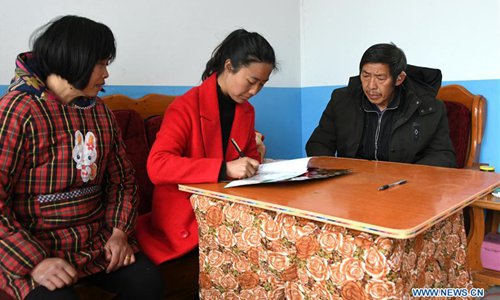
Cheng Ju (C) visits a villager's home at Dashi Village of Chongyang County in Xianning City, central China's Hubei Province, Feb. 11, 2018. Cheng Ju, born in 1990, comes from Dashi Village of Chongyang County in Xianning City, central China's Hubei Province. In 2014, she gave up high-paying job in south China's Guangzhou and returned to her hometown to work as a village Party secretary. Cheng's new job has been confronted with challenges as Dashi Village was once a widely known poverty-stricken village. Over the past three years, she led the villagers to develop local collective economy by building a solar power base and a tea plantation. Infrastructure was also greatly enhanced with roads paved and a service center established. Under the leadership of Cheng, 106 people from 35 households at the village shook off poverty. Apart from helping develop local industry, Cheng also focuses on the improvement of environment and the development of local tourism resources. She believes that the village can rely on it natural landscape to attract more tourists once the environment gets better. As a newly-elected deputy to China's top legislature National People's Congress, one of Cheng's proposals to this year's NPC is to build a more complete system of garbage classification in rural areas. (Xinhua/Liang Jianqiang)
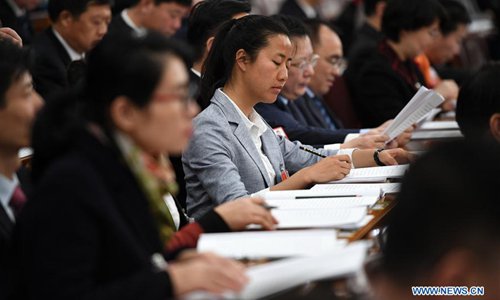
Cheng Ju, a newly-elected deputy to the 13th National People's Congress (NPC), attends the second plenary meeting of the first session of the 13th NPC in Beijing, capital of China, March 9, 2018. Cheng Ju, born in 1990, comes from Dashi Village of Chongyang County in Xianning City, central China's Hubei Province. In 2014, she gave up high-paying job in south China's Guangzhou and returned to her hometown to work as a village Party secretary. Cheng's new job has been confronted with challenges as Dashi Village was once a widely known poverty-stricken village. Over the past three years, she led the villagers to develop local collective economy by building a solar power base and a tea plantation. Infrastructure was also greatly enhanced with roads paved and a service center established. Under the leadership of Cheng, 106 people from 35 households at the village shook off poverty. Apart from helping develop local industry, Cheng also focuses on the improvement of environment and the development of local tourism resources. She believes that the village can rely on it natural landscape to attract more tourists once the environment gets better. As a newly-elected deputy to China's top legislature National People's Congress, one of Cheng's proposals to this year's NPC is to build a more complete system of garbage classification in rural areas. (Xinhua/Wang Jianhua)

Cheng Ju (R) talks with an elderly villager at Dashi Village of Chongyang County in Xianning City, central China's Hubei Province, Feb. 11, 2018. Cheng Ju, born in 1990, comes from Dashi Village of Chongyang County in Xianning City, central China's Hubei Province. In 2014, she gave up high-paying job in south China's Guangzhou and returned to her hometown to work as a village Party secretary. Cheng's new job has been confronted with challenges as Dashi Village was once a widely known poverty-stricken village. Over the past three years, she led the villagers to develop local collective economy by building a solar power base and a tea plantation. Infrastructure was also greatly enhanced with roads paved and a service center established. Under the leadership of Cheng, 106 people from 35 households at the village shook off poverty. Apart from helping develop local industry, Cheng also focuses on the improvement of environment and the development of local tourism resources. She believes that the village can rely on it natural landscape to attract more tourists once the environment gets better. As a newly-elected deputy to China's top legislature National People's Congress, one of Cheng's proposals to this year's NPC is to build a more complete system of garbage classification in rural areas. (Xinhua/Liang Jianqiang)
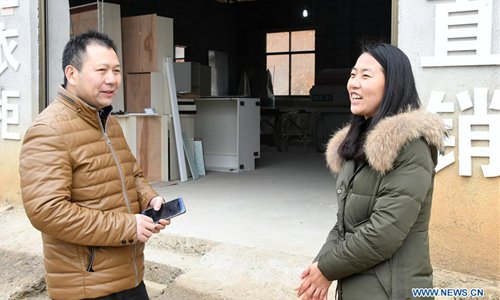
Cheng Ju (R) talks with a villager who has returned home for business at Dashi Village of Chongyang County in Xianning City, central China's Hubei Province, Feb. 11, 2018. Cheng Ju, born in 1990, comes from Dashi Village of Chongyang County in Xianning City, central China's Hubei Province. In 2014, she gave up high-paying job in south China's Guangzhou and returned to her hometown to work as a village Party secretary. Cheng's new job has been confronted with challenges as Dashi Village was once a widely known poverty-stricken village. Over the past three years, she led the villagers to develop local collective economy by building a solar power base and a tea plantation. Infrastructure was also greatly enhanced with roads paved and a service center established. Under the leadership of Cheng, 106 people from 35 households at the village shook off poverty. Apart from helping develop local industry, Cheng also focuses on the improvement of environment and the development of local tourism resources. She believes that the village can rely on it natural landscape to attract more tourists once the environment gets better. As a newly-elected deputy to China's top legislature National People's Congress, one of Cheng's proposals to this year's NPC is to build a more complete system of garbage classification in rural areas. (Xinhua/Liang Jianqiang)
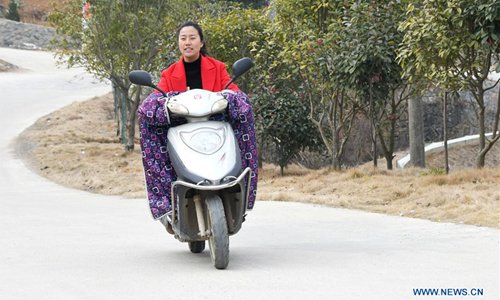
Cheng Ju rides an electric motorcycle at Dashi Village of Chongyang County in Xianning City, central China's Hubei Province, Feb. 11, 2018. Cheng Ju, born in 1990, comes from Dashi Village of Chongyang County in Xianning City, central China's Hubei Province. In 2014, she gave up high-paying job in south China's Guangzhou and returned to her hometown to work as a village Party secretary. Cheng's new job has been confronted with challenges as Dashi Village was once a widely known poverty-stricken village. Over the past three years, she led the villagers to develop local collective economy by building a solar power base and a tea plantation. Infrastructure was also greatly enhanced with roads paved and a service center established. Under the leadership of Cheng, 106 people from 35 households at the village shook off poverty. Apart from helping develop local industry, Cheng also focuses on the improvement of environment and the development of local tourism resources. She believes that the village can rely on it natural landscape to attract more tourists once the environment gets better. As a newly-elected deputy to China's top legislature National People's Congress, one of Cheng's proposals to this year's NPC is to build a more complete system of garbage classification in rural areas. (Xinhua/Liang Jianqiang)
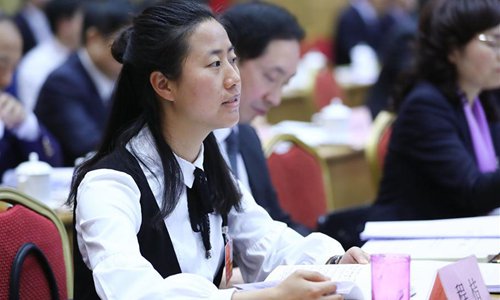
Cheng Ju, a newly-elected deputy to the 13th National People's Congress (NPC), attends a panel discussion in Beijing, capital of China, March 12, 2018. Cheng Ju, born in 1990, comes from Dashi Village of Chongyang County in Xianning City, central China's Hubei Province. In 2014, she gave up high-paying job in south China's Guangzhou and returned to her hometown to work as a village Party secretary. Cheng's new job has been confronted with challenges as Dashi Village was once a widely known poverty-stricken village. Over the past three years, she led the villagers to develop local collective economy by building a solar power base and a tea plantation. Infrastructure was also greatly enhanced with roads paved and a service center established. Under the leadership of Cheng, 106 people from 35 households at the village shook off poverty. Apart from helping develop local industry, Cheng also focuses on the improvement of environment and the development of local tourism resources. She believes that the village can rely on it natural landscape to attract more tourists once the environment gets better. As a newly-elected deputy to China's top legislature National People's Congress, one of Cheng's proposals to this year's NPC is to build a more complete system of garbage classification in rural areas. (Xinhua/Zhang Yuwei)

Cheng Ju, a newly-elected deputy to the 13th National People's Congress (NPC), makes phone calls in Beijing, capital of China, March 12, 2018. Cheng Ju, born in 1990, comes from Dashi Village of Chongyang County in Xianning City, central China's Hubei Province. In 2014, she gave up high-paying job in south China's Guangzhou and returned to her hometown to work as a village Party secretary. Cheng's new job has been confronted with challenges as Dashi Village was once a widely known poverty-stricken village. Over the past three years, she led the villagers to develop local collective economy by building a solar power base and a tea plantation. Infrastructure was also greatly enhanced with roads paved and a service center established. Under the leadership of Cheng, 106 people from 35 households at the village shook off poverty. Apart from helping develop local industry, Cheng also focuses on the improvement of environment and the development of local tourism resources. She believes that the village can rely on it natural landscape to attract more tourists once the environment gets better. As a newly-elected deputy to China's top legislature National People's Congress, one of Cheng's proposals to this year's NPC is to build a more complete system of garbage classification in rural areas. (Xinhua/Zhang Yuwei)
